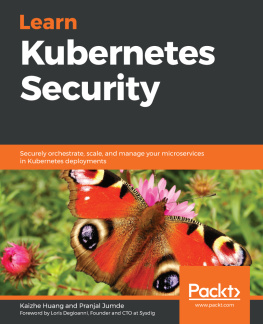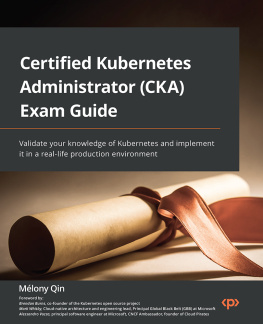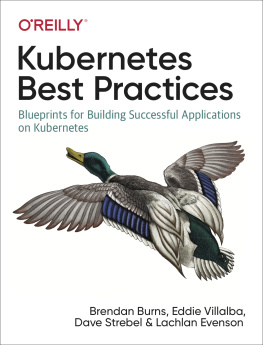Learn Kubernetes Security
Securely orchestrate, scale, and manage your microservices in Kubernetes deployments
Kaizhe Huang
Pranjal Jumde
BIRMINGHAMMUMBAI
Learn Kubernetes Security
Copyright 2020 Packt Publishing
All rights reserved. No part of this book may be reproduced, stored in a retrieval system, or transmitted in any form or by any means, without the prior written permission of the publisher, except in the case of brief quotations embedded in critical articles or reviews.
Every effort has been made in the preparation of this book to ensure the accuracy of the information presented. However, the information contained in this book is sold without warranty, either express or implied. Neither the author(s), nor Packt Publishing or its dealers and distributors, will be held liable for any damages caused or alleged to have been caused directly or indirectly by this book.
Packt Publishing has endeavored to provide trademark information about all of the companies and products mentioned in this book by the appropriate use of capitals. However, Packt Publishing cannot guarantee the accuracy of this information.
Commissioning Editor: Vijin Boricha
Acquisition Editor: Meeta Rajani
Senior Editor: Arun Nadar
Content Development Editor: Romy Dias
Technical Editor: Sarvesh Jayant
Copy Editor: Safis Editing
Project Coordinator: Neil Dmello
Proofreader: Safis Editing
Indexer: Rekha Nair
Production Designer: Aparna Bhagat
First published: July 2020
Production reference: 1080720
Published by Packt Publishing Ltd.
Livery Place
35 Livery Street
Birmingham
B3 2PB, UK.
ISBN 978-1-83921-650-3
www.packt.com
For my lovely wife, Melody, who encouraged me to step out of my comfort zone and take on challenges.
Kaizhe Huang
To my family and all the avid readers.
Pranjal Jumde

Packt.com
Subscribe to our online digital library for full access to over 7,000 books and videos, as well as industry leading tools to help you plan your personal development and advance your career. For more information, please visit our website.
Why subscribe?
- Spend less time learning and more time coding with practical eBooks and Videos from over 4,000 industry professionals
- Improve your learning with Skill Plans built especially for you
- Get a free eBook or video every month
- Fully searchable for easy access to vital information
- Copy and paste, print, and bookmark content
Did you know that Packt offers eBook versions of every book published, with PDF and ePub files available? You can upgrade to the eBook version at packt.com and as a print book customer, you are entitled to a discount on the eBook copy. Get in touch with us at customercare@packtpub.com for more details.
At www.packt.com, you can also read a collection of free technical articles, sign up for a range of free newsletters, and receive exclusive discounts and offers on Packt books and eBooks.
Foreword
If you aren't using Kubernetes yet, you will be soon.
Kubernetes is not only the de facto platform to run modern, service-based applications. With cloud vendors quickly embracing it, it's also becoming the Operating System of the cloud. The reason for this success is that Kubernetes is powerful, versatile, and designed with modern software lifecycles in mind. On the other hand, Kubernetes is also a complicated beast. Gone are the days when running software meant managing processes on a single server. Now you have to deal with containers running in clusters that can reach thousands of machines in size, accessed by many developers organized in teams with different responsibilities.
Security has traditionally been an important area of focus when running software applications, either large or small. However, the dramatic increase in complexity and the additional degrees of freedom make Kubernetes security even more critical and harder!
Without doubt, security is one of the most important aspects of running Kubernetes applications in production. A correct Kubernetes security methodology involves, among other things, protecting the pipeline through image scanning, ensuring that the principle of least privilege is respected, defending pods at runtime, and segmenting the network. All of this while gathering enough information to understand when a threat is happening and what the blast radius was after it happened.
This is a lot to handle and requires a substantial amount of learning. One of the things that I love most about Open Source is that all you need to educate yourself is available for you in a number of forums: docs, tutorials, slack channels, conferences. Kubernetes, from this point of view, is no exception. Its huge community has produced a lot of content and you can definitely use it to become an expert. Alternatively, by studying this book, you can become a Kubernetes security expert by taking advantage of the wisdom of two seasoned operators, who live and breathe Kubernetes security and have done so for years.
The book will guide you gently, starting from a high-level introduction to the concepts at the base of Kubernetes before diving into the more advanced and nuanced aspects of securing a production cluster. It will do it in a way that is digestible even if you are not an expert, but at the same time will provide useful information even if you already have experience in the field. While reading it, I particularly appreciated the section questions at the end of each chapter, where you can test what you learned. I also loved the links section showing where you can go to get additional details.
Having founded Sysdig, one of the leading companies in Kubernetes security, I consider myself pretty knowledgeable on the subject. At the same time, the authors of this book are people I go to when things go beyond my skill level or when I want to learn something new. You won't be disappointed if you do the same.
Happy reading.
Loris Degioanni
Founder and CTO at Sysdig
Contributors
About the authors
Kaizhe Huang is a security researcher at Sysdig, where he researches how to defend Kubernetes and containers from attacks ranging from web attacks to kernel attacks. Kaizhe is one of the maintainers of Falco, an incubation-level CNCF project, and the original author of multiple open source projects, such as kube-psp-advisor. Before joining Sysdig, as an employee at Stackrox, Kaizhe helped build a detection data pipeline, conducted security research, and innovated detection based on machine learning. Previously, as a senior security engineer at Oracle, he helped build security products: Database Vault, Database Privilege Analyzer, and Database Assessment Tool. Kaizhe holds an MS degree in information security from Carnegie Mellon University.
I want to thank my lovely wife, Melody, and my family members without your support and prayers, I wouldn't have been able to finish the book. Thanks to my manager, Omer, for giving me the opportunity and freedom to explore and innovate. Thanks to my Sysdig coworkers; you always inspire me. Thank you, Pranjal without your commitment, I wouldn't have been able to do this. Thanks to everyone on my publishing team. Thanks to my dog, Emma, who helped me relax during writing.






